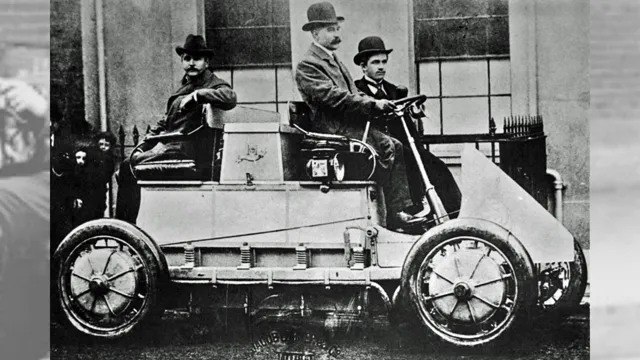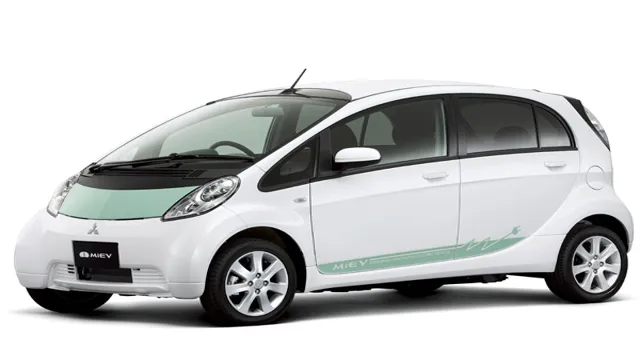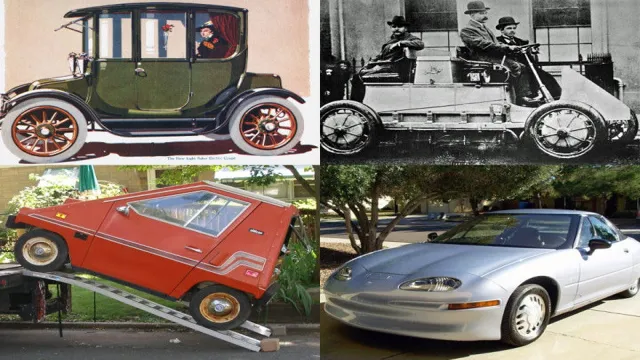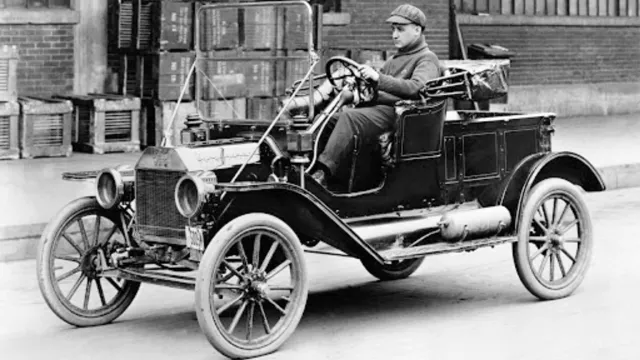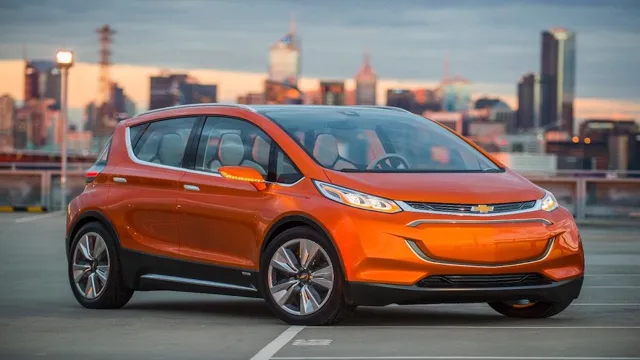Revving Up the Past: A Fascinating Timeline of Electric Cars Throughout History
Electric cars have been around for quite some time now and have been evolving rapidly in the past few years. With the growing concerns of climate change and the depletion of natural resources, more and more people are turning towards electric cars as a sustainable solution to commute. But have you ever wondered about the history of these clean vehicles? How they came to be and how they have transformed over the years? The first electric car was created in the early 1800s, long before gasoline-powered cars came into existence.
However, it wasn’t until the late 19th century that electric cars saw a surge in popularity. During this time, electric cars were favored over gasoline-powered vehicles due to their quiet and smooth operation. They were also seen as a symbol of high-class living since only the elite could afford them.
As the 20th century progressed, gasoline cars became more popular due to their affordability and ease of use. However, the 1970s oil crisis caused a renewed interest in electric cars once again. Many car manufacturers started producing electric vehicles, but they were limited in range and were not ideal for long-distance travel.
The turn of the millennium saw a renewed interest in electric cars, thanks to the advancements in technology. With the development of more efficient batteries and electric motors, electric vehicles are now more powerful and have a longer range than ever before. Today, electric cars are gaining popularity and are seen as the future of transportation.
In conclusion, the history of electric cars is fascinating, and their journey to becoming what they are today is a testament to human innovation and progress. With the concerns of climate change and environmental degradation, it’s exciting to see how electric cars will transform in the future as we strive towards more sustainable solutions.
Early Days of Electric Cars
Back in the early days of the electric car history, electric vehicles (EVs) were all the rage. It was around the late 19th century that EVs were introduced, with the first electric car invented in the 1830s. These vehicles were a popular alternative to gasoline cars and were used by women and seniors due to their ease of handling.
As electricity became more widely distributed and batteries improved, there was even a brief period where the dominance of EVs seemed inevitable. However, the mass production of gasoline cars and the affordability of gasoline relative to electricity caused the demise of electric cars. It wasn’t until decades later that EVs regained popularity due to environmental concerns and technological advancements.
Today, the electric car market continues to grow rapidly, and the future of transportation is looking electrifying.
Brief on the invention of the first electric car
The early days of electric cars can be traced back to the 1830s when the first electric vehicle was invented. Scottish inventor Robert Anderson is credited with this invention. However, the real breakthrough for electric vehicles was made in the 1880s when Thomas Parker, an English inventor, created the first practical electric car.
His design used rechargeable batteries to power the electric motor. This was a significant step forward, as it meant that electric cars had a range of up to 100 miles on one charge. This made electric cars a popular choice for personal transportation, and the first electric taxi services were established in London in the late 19th century.
While gasoline-powered cars quickly overtook electric cars in popularity, the early development of electric cars paved the way for the advancements we see today, with electric and hybrid vehicles becoming more and more common on our roads.
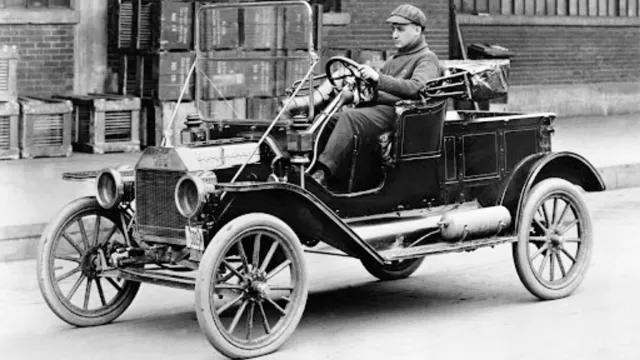
Why electric cars were popular in the late 19th century?
Electric cars were all the rage in the late 19th century for several reasons. Firstly, gasoline-powered cars were not as dominant as they are now, leading to less competition. Additionally, electric cars were seen as cleaner and easier to operate than gasoline-powered counterparts.
Moreover, they were more comfortable and quieter to ride in, as they did not emit any noise or fumes. Cities with electric tram systems and electrically-powered lighting made people more comfortable with the idea of using electricity for transportation. Electric cars also appealed to women, as they required significantly less physical exertion than gasoline-powered cars to start and operate.
However, despite the initial popularity of electric cars, they fell out of favor in the early 20th century when gasoline was used as fuel for cars, due to its cheapness and accessibility. Nonetheless, electric cars have recently experienced a resurgence in popularity as they are now seen as more environmentally friendly and fuel-efficient.
Decline and Resurgence of Electric Vehicles
The history of the electric car is as old as the automobile itself, with electric vehicles being among the earliest cars to be developed in the late 19th century. However, the mass production of gasoline-powered cars in the early 20th century overtook the dominance of electric cars and relegated them to a niche market. The shift to electric cars remained sluggish until the 1990s, with the introduction of the Toyota Prius and Tesla Roadster sparking a boom in electric car demand.
Advancements in battery technology and government incentives further reinforced the revival of electric cars, leading to their increasing popularity in recent years. Today, electric cars are seen as the future of transportation, with innovations in battery technology and infrastructure development making them a viable and environmentally-friendly alternative to gasoline-powered vehicles. As a result, major car manufacturers around the world are investing heavily in electric cars, with the potential to revolutionize the entire automotive industry.
Reasons for the decline of electric cars in the early 20th century
The early 20th century saw a decline in the popularity of electric cars, despite their popularity in the late 19th century. The main reason for this decline was the development of gasoline-powered cars, which offered greater range and speed than electric cars. Additionally, the discovery of oil in the early 1900s made gasoline cheap and readily available, which further pushed the popularity of gasoline-powered cars.
The limited range of electric cars, coupled with the lengthy charging time, made them impractical for long distance travel, further contributing to their decline. However, with the growing concern over the environment and the need for sustainable transportation options, electric cars have seen a resurgence in recent years. Advancements in battery technology have greatly improved the range and charging time of electric cars, making them a viable option for everyday use.
The promotion of electric cars by governments and the availability of charging stations have also contributed to their increasing popularity. With electric cars becoming more affordable, convenient, and environmentally-friendly, it’s no wonder why they are once again gaining popularity among consumers.
Factors that led to the resurgence of electric vehicles in the 21st century
Electric vehicles have been around for almost as long as their gasoline-powered counterparts, but they never managed to gain widespread acceptance due to several reasons. However, in recent years, several factors have come together to cause a resurgence of EVs. Environmental concerns and global regulations have driven manufacturers to develop more fuel-efficient vehicles, and electric cars have emerged as a viable alternative to traditional gasoline-powered vehicles.
Advances in battery technology have significantly improved the range and performance of electric cars while driving down their cost, making them more practical and affordable for consumers. Additionally, government incentives such as tax credits and rebates have made it more financially viable for consumers to purchase electric cars. As a result of these factors and others, electric vehicles are now firmly positioned as a viable transportation option that is rapidly gaining popularity across the world.
Economic and environmental benefits of electric cars
Electric cars have come a long way in recent years, seeing both a decline and resurgence in popularity. In the early 1900s, electric cars were actually more popular than gas-powered vehicles. However, the invention of the electric starter for gas engines in 1912 made gas-powered cars easier to operate and ultimately surpassed electric vehicles as the popular choice.
Fast forward to the 21st century and electric cars have once again become a hot topic as people search for more sustainable transportation options. With advancements in technology, electric cars are now more efficient and cost-effective than ever before. Additionally, they offer numerous environmental benefits, including reduced greenhouse gas emissions and decreased dependence on traditional fossil fuels.
As more and more individuals make the switch to electric, it’s likely that we will see continued innovation and improvements in this sustainable transportation option.
Future of Electric Cars
Looking back on the electric car history, it’s fascinating to see how far we’ve come in terms of eco-friendliness and sustainability. Electric cars may have started as a niche market in the automotive industry, but as technology continues to advance, they are becoming more accessible and popular. With the rise of renewable energy sources, it’s becoming increasingly feasible to generate the electricity needed to power these vehicles without relying on fossil fuels.
As we look to the future of electric cars, it’s clear that they have the potential to revolutionize the way we travel. Not only do they reduce our carbon footprint, but they also offer a quieter and smoother driving experience. As more and more automakers invest in electric vehicles, we can expect to see a wider range of options available to consumers, making it easier than ever to make the switch to a more sustainable mode of transportation.
Technological advancements and innovations in electric cars
Electric cars have come a long way since their inception, and their future looks brighter than ever. With technological advancements and innovations in the automotive industry, electric vehicles are becoming more efficient, affordable, and viable for mass production. One of the key driving forces behind the electric car revolution is the transition to renewable energy.
More and more governments are encouraging the use of clean energy, which means the mainstreaming of electric cars is inevitable. The future of electric cars is electric power sources that are increasingly renewable. From the use of solar panels, wind turbines, and hydroelectric dams, the energy mix for electric cars being charged is getting greener.
This progression will reduce the carbon footprint created by transportation, ultimately meaning a cleaner environment and better air quality for everyone. In the coming years, we can expect to see more advanced battery technology, better charging infrastructure, and longer driving ranges for electric cars. Overall, with zero emissions and lower fuel costs, electric vehicles are the future of sustainable transportation.
Electric cars in the context of renewable energy and sustainability
The future of electric cars is looking bright as more and more people become aware of the environmental benefits they offer. As we shift away from fossil fuels and towards renewable energy sources, electric cars are becoming increasingly popular for their low carbon emissions and energy efficiency. With advancements in battery technology, electric cars are also becoming more affordable and practical for everyday use.
In fact, some car manufacturers are already planning to phase out gas-powered cars entirely in the near future. As we continue to make progress towards a more sustainable and environmentally friendly world, electric cars will undoubtedly play a key role in reducing our carbon footprint and enhancing our quality of life. So, if you’re considering purchasing a new car, why not consider going electric? It’s a small but significant way to make a positive impact on the planet.
Conclusion
In the realm of transportation, the electric car has had its fair share of ups and downs. From the early days of battery-powered models to the current advancements in modern, sleek designs, the electric car has come a long way. While some may argue that its history has been bumpy, the truth is that the electric car represents the future of sustainable and eco-friendly travel.
So, whether you’re a Tesla enthusiast or just someone looking to minimize their carbon footprint, the electric car is here to stay. We can all charge up, buckle in, and drive into a cleaner, brighter future.”
FAQs
What is the history of the electric car?
The history of the electric car dates back to the late 1800s, when early prototypes were developed. However, it wasn’t until the late 1990s that electric cars became commercially available.
What were some of the first electric cars?
Some of the first electric cars included the Bersey Electric and the Woods Electric. These vehicles were popular in urban areas in the late 1800s and early 1900s due to their quiet operation and lack of emissions.
When did the popularity of electric cars decline?
The popularity of electric cars declined in the early 1900s due to improvements in gasoline-powered cars and lower oil prices. Additionally, advancements in the production of lead-acid batteries made them more affordable and accessible.
What led to the revival of electric cars in the late 1990s?
The revival of electric cars in the late 1990s was due to concerns about the environment and the need to reduce greenhouse gas emissions. The introduction of the Toyota Prius and the Tesla Roadster helped to increase public interest in electric cars.
